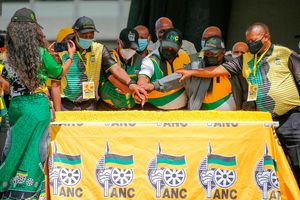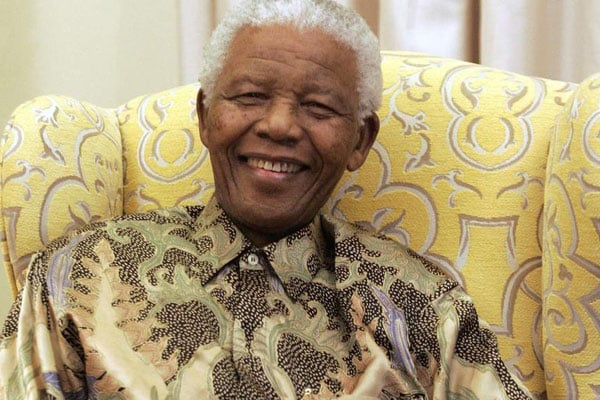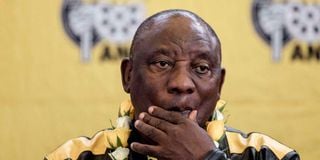
South African President Cyril Ramaphosa looks on as he addresses new members of the African National Congress (ANC) during an election campaign ahead of the 2024 general elections, at the Nelson Mandela Community Youth Centre in Chatsworth township, north of Durban, on May 14, 2023.
South Africa’s political scene is expected to heat up these coming weeks ahead of the polls that could determine the fate of the ruling African National Congress (ANC).
In fact, the heat started months earlier. Late last year, 11 parties opposed to the 30-year rule of the African National Congress (ANC) agreed that they would combine their collective support in the forthcoming national elections to oust the ‘party of Nelson Mandela’.
With the official opposition Democratic Alliance (DA) playing a leading role, the Multi-Party Charter (MPC) was formed as an expedient between parties, which often disagree on policy. This time, they all said it was ‘essential’ for the rectification of South Africa’s much-damaged economy – the singular agreed objective of this voting coalition being the removal of the ANC from power.
Since historic highs of support through the 1990s and into the first decade of this century at over two-thirds of the vote, the ANC initially retained national and provincial hegemony, controlling all major levers of power and all nine provinces. But it has suffered corruption scandals and become gradually detached from the masses’ needs.
The signs have been on the wall. At the local government elections of 2021, ANC’s support fell below 50 percent of the total vote. Now the question is which of the opposition movements will provide a new political home for the disenchanted voters.
The formation of the Multi-Party Charter has changed that calculus, according to a new poll.

Hilda Mulayo, a veteran African National Congress (ANC) Women League and a former school mate of South African President Cyril Ramaphosa, holds placards outside the National Recreation Center (NASREC) in Johannesburg, on December 16, 2022.
In a recent study, David Everatt, Professor of Urban Governance at the University of Witwatersrand in Johannesburg, found that of likely voters, only 39 percent said they were willing to give the ANC another chance.
More worrying for President Cyril Ramaphosa and his ANC colleagues is that of the 9,000 statistically-selected likely voters, 38 percent said they would support the new MPC.
Usually held around end of April, to coincide with the historic 1994 poll in which people of all races were allowed to vote for the first time in this country, the provincial and national polls could be delayed as late as the end of August, depending on President Ramaphosa’s decision.
That delays may give more time for the ANC to show some progress against historically high unemployment levels, pervasive poverty, persistent power outages which have now become part of life, and improved ‘service delivery’, as well as meaningful action against corruption – all sore points for many South Africans.
But a delay in the polling date by a few months is unlikely to resolve the long-standing issues over which the ANC has had the power to take action, but which have only become worse with time, rather than better.
Last year, for example, in a bid to bring economically damaging daily power outages to an end, Ramaphosa appointed an electricity minister whose role was to ensure power flowing reliably again. Those outages have continued, albeit at a slightly reduced rate.

South Africa's President and African National Congress party's President Cyril Ramaphosa is assisted by other members to cut the birthday cake during the ANC's 110th anniversary celebrations at the Old Peter Mokaba Stadium in Polokwane, on January 8, 2022.
ANC, however, may have a way out. That is if it swallows the pride into some convenient coalition with the hard left Economic Freedom Fighters (EFF) led by firebrand Julius Malema.
Formed as a breakaway from the ANC in 2013, the EFF showed some initial rapid gains, reaching 10.3 percent support in the 2021 local government elections, and is expected to grow to around the mid-teens, perhaps 15 to 16 percent, in the next elections.
This gives a much-weakened ANC a singular possible ally that could save it from being tossed aside after decades in power, as has happened to so many African liberation movements elsewhere.
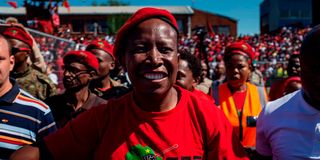
South Africa's Economic Freedom Fighters (EFF) leader Julius Malema.
But being the ‘king-maker’, a role the EFF has played previously in several cities and towns, will come at a high price for the ANC and is very unlikely to last long.
For one thing, the policies of the ANC and the EFF are fundamentally different, the ANC oscillating, issue-dependent, between ‘soft socialist’ policies on public health and other key services to citizens, and a more hardline stance of promoting by law those previously the victims of race-based oppression under apartheid.
The EFF, meanwhile, is overtly ‘Marxist-Leninist’, of the hardest kind.
Malema previously told the Nation, in one of his most in-depth interview of his political career, that “when the EFF comes to power, not if it does”, it will nationalise nearly everything.
This includes the Reserve Bank and all other commercial banks, all commercial farms, all or nearly all businesses especially major sectoral players, all mines and mining, and probably much private property, to be owned collectively by the state, or in the case of farms and residential properties seized, to be distributed by the state to those who have nothing.

Supporters of South African President Cyril Ramaphosa celebrate after he was re-elected as African National Congress (ANC) leader during the 55th National Conference of the ANC at the National Recreation Center (NASREC) in Johannesburg on December 19, 2022.
Malema is an admirer of Zimbabwe’s deceased former “revolutionary leader” Robert Mugabe and his ‘land grab’ of the early 2000s which led to the collapse of the Zimbabwe economy, a disaster from which that country has not yet begun to recover.
In South Africa, he told the Nation, that picture would not be repeated, but even if it was, to some degree, that would still be better than the current situation where the negative heritage for the majority – after three centuries of colonialism and nearly five decades of highly-focused racist oppression – had yet to be substantively undone.
Asked if he and the EFF would work with the ANC, Malema said that his party would “work with anyone”, to get the country to where he wanted it. EFF wants a fully Marxist state wherein the state itself runs and owns, in effect, everything.
A compact between the ANC and the EFF, as may seem a possibility – has been tried and failed repeatedly before at metro and local government levels. Their relations, in fact, could strain, not improve in this election, some observers argue.
This opinion poll is only an indicator of what might be going on in the potential electorate, as admitted by the authors of the Wits poll showing ANC support sliding below even the 40 percent level.
The pollster says it conducted the study rigorously and participants were questioned in their own home language: South Africa having 11 spoken languages and international sign language recognised officially.
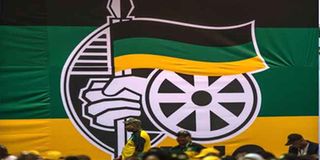
A file photo of the flag of the African National Congress (ANC), South Africa's governing party.
This means that the interviewers could delve into nuances and subtleties usually lost in generic pollster questions.
What they found was highly unexpected and running against perceive trends, as shown by ongoing citizen protests over poor or non-existent services supposed to be delivered by government at various levels. Those included electricity supply and fresh water, through sewage and waste removal, policing in high crime areas and many other co-travelling issues.
Rather than the expected boycott to protest bad service, it appears that citizens have been galvanised by a real alternative to voting for a party which they perceive to be ‘the least bad’, and rather for a loose coalition which broadly represents what they want to see from their government.
Many of those surveyed had not previously heard of the new anti-ANC coalition of parties, the MPC – but even among these people, there was a high level of interest in this new feature of the political playing field.
And a previously ‘open’ question, whether the EFF would join with the other parties opposing the ANC, has been ruled out with Democratic Alliance leader John Steenhuisen saying there was “no possibility” of the EFF joining the anti-ANC grouping. That is because the EFF’s seven-pillar policy platform was fundamentally at odds with those of the 11 participating parties, he argued.
ANC’s own survey from earlier last year showed that it might expect 48 percent support at the polls. It may be driven by circumstance to rely for its retention of power on the EFF – one of its harshest critics.
How such a volatile coalition, as may be formed by a weakened ANC and a rampant EFF, might work remains to be seen.



